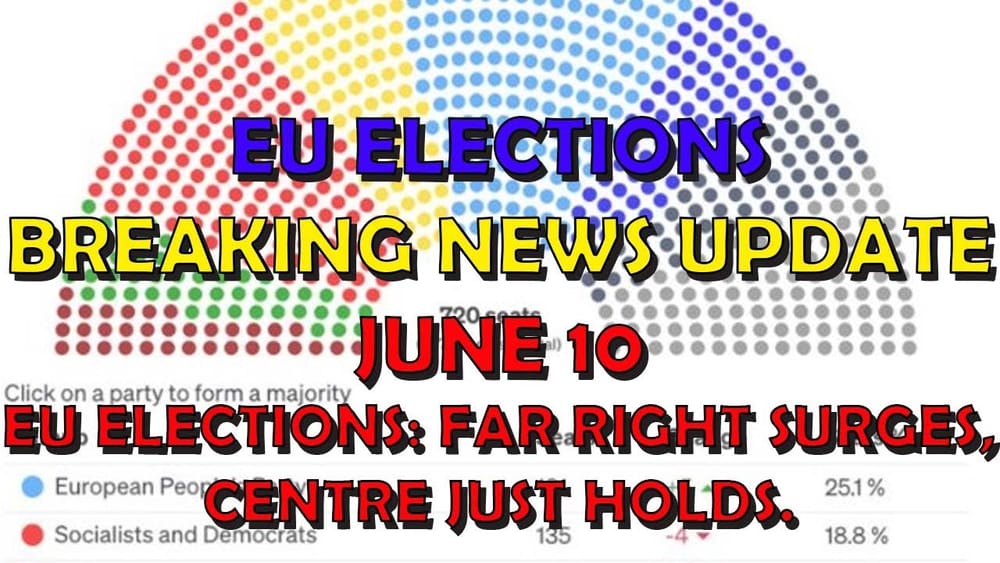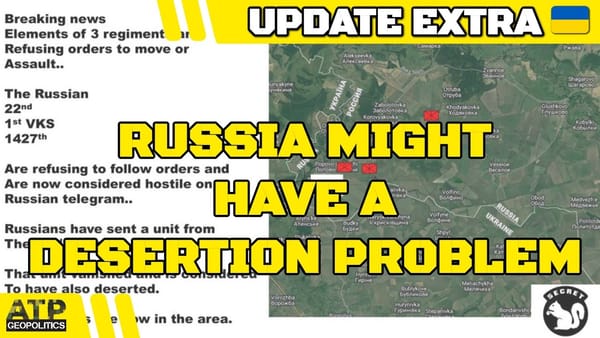EU Elections BREAKING NEWS: Far Right Surges, Centre Right Holds
Table of Contents 📖
"How do you deal with that from a counterintelligence point of view when your main enemy is Russia this is this is a major part of the problem that I think will become more and more apparent as the months go on"
Hello Team
🎦 00:00-00:08⏩
Jonathan welcomes viewers to an ATP Geopolitics video providing a synopsis of the EU elections, highlighting their significance for European politics and policy on issues such as the climate, immigration, economics, and Ukraine.
Return to top⤴️
Overview of EU Parliament Election Results
🎦 00:08-04:15⏩
Jonathan outlines the potential impact of the recent EU Parliament elections. While initial concerns about a massive far-right surge were somewhat allayed, the situation is complex. He explains the EU Parliament's faction system and the significance of coalitions. Despite the centre-right EPP claiming victory and the overall picture appearing similar to the previous parliament, Jonathan expresses concern about the growth of far-right and non-aligned factions, especially in key countries like France and Germany. He also highlights the counterintelligence challenges posed by far-right connections to Russia.
Return to top⤴️
France: Far-Right Surge and Macron's Gamble
🎦 04:15-15:26⏩
Jonathan analyses the French election results, where Marine Le Pen's far-right National Rally party secured significant gains. He presents a map vividly illustrating the National Rally's dominance across French communes, contrasting it with the differing results in Paris, which favoured centrist and left-leaning parties. Jonathan discusses the implications of the urban-rural political divide and the importance of population density when interpreting election maps. He also notes Macron's risky decision to call for snap parliamentary elections following the National Rally's success and explores potential scenarios ranging from a Macron victory to a cohabitation with the far-right. He concludes by highlighting the potential impact on French military support for Ukraine.
Return to top⤴️
Germany: East-West Divide and AFD Gains
🎦 15:26-19:37⏩
Jonathan examines the German election results, where the far-right AfD made gains, albeit less significant than initially feared. He observes a clear East-West divide in Germany, with the East favouring the AfD and the pro-Russian BSW party. He expresses concern over the normalisation of far-right views, citing Elon Musk's questioning of the negative reaction towards the AfD. Jonathan concludes by highlighting the worrying trend of increased support for far-right and pro-Russian sentiments in Germany.
Return to top⤴️
Other Notable Results: Belgium, Hungary, and Austria
🎦 19:37-20:03⏩
Jonathan briefly covers other noteworthy election outcomes. In Belgium, Prime Minister Alexander De Croo announced his resignation following his party's defeat. In Hungary, while Viktor Orbán's party secured the most votes, their performance fell short of expectations, with opposition leader Péter Márki-Zay hailing it as a potential turning point. In Austria, the far-right FPO party emerged victorious, prompting Chancellor Karl Nehammer to pledge addressing voter concerns.
Return to top⤴️
Synopsis of Key Trends
🎦 20:03-24:16⏩
Jonathan provides a summary of the EU election results, drawing on reports from The Guardian. He reiterates that while the far-right made gains, the mainstream pro-European parties retained their majority. He highlights Ursula von der Leyen's statement emphasising the centre's resilience and the responsibility it places on centrist parties. Jonathan notes the far right's performance in Italy, Austria, and the Netherlands, drawing attention to the varying degrees of extremism within right-wing parties.
Return to top⤴️
Nordic Countries Buck the Trend
🎦 24:16-27:25⏩
Jonathan points out that the Nordic countries deviated from the general trend, with left-wing and Green parties gaining ground while far-right support diminished. In Sweden, the anti-immigration Sweden Democrats lost ground, while the Green party emerged as the third-largest. In Denmark, the Socialist People's Party became the largest, prompting Prime Minister Mette Frederiksen to welcome the success of left-wing parties. Jonathan contrasts this with the broader European context where right-wing parties made significant advances.
Return to top⤴️
Spain: Centre-Right Victory and Far-Right Gains
🎦 27:25-30:28⏩
Jonathan discusses the Spanish election results, where the centre-right People's Party (PP) narrowly defeated the governing Socialists (PSOE). While the far-right Vox party saw its seats increase, the PP downplayed their success, emphasising a message of unity and bridge-building. However, Jonathan expresses concern about the potential impact of immigration on Spanish politics, noting that the country's geographical location makes it susceptible to concerns about migration from North Africa, which often fuel right-wing sentiments.
Return to top⤴️
Poland and Bulgaria: Mixed Results
🎦 30:28-31:37⏩
Jonathan briefly touches upon the results in Poland and Bulgaria. In Poland, Donald Tusk's pro-European Civic Coalition performed well, securing a close second place behind the ruling Law and Justice party. In Bulgaria, while the centre-right performed well, the ultra-nationalist Revival party garnered a concerning percentage of the vote. Jonathan reiterates his worry about the consistent success of far-right parties across Europe.
Return to top⤴️
Analysis of Voting Patterns and Interactive Resources
🎦 31:37-34:19⏩
Jonathan encourages viewers to explore interactive resources, like those provided by The Guardian, to delve deeper into specific country results and party alignments. He notes the significant losses experienced by left-leaning parties and the rise of non-aligned and far-right factions. He concludes by highlighting the value of these resources for understanding the complexities of the election outcomes across different countries.
Return to top⤴️
Wrap up
🎦 34:19-34:19⏩
Jonathan concludes the video.
Return to top⤴️




